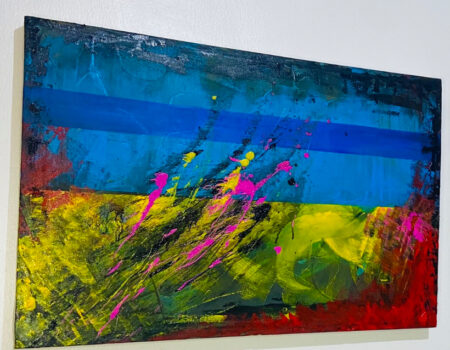The house is a four-bedroom apartment located in the bustling heart of Ibadan, around the Olorunsogo axis. It’s the kind of place that is never quiet, with the mornings bringing a cacophony of noise from bus drivers calling out to commuters.
Due to the recent hike in petrol price, many commuters opt for the early buses which offer reduced fares, even if they have nothing pressing to attend to at work in the morning. And the evenings are no different, as they return to their dwellings, canteens, and beer parlors filled with men sporting big bellies.
The norm of women being the primary gossipers seems to be challenged here. These men gossip about everything from nontrivial matters like the state of Nigerian roads to more personal topics, like Ogedengbe’s wife who travels and comes back home every two weeks.
“The man has turned into a woman, cooking and taking care of the kids. Soon he’ll be wearing a wrapper,” they jest under the dim lights of the beer parlor, delighting in the company of the young, curvaceous bar attendant whose job is to bring spicy pepper soup.
I was abruptly brought back to reality.
“Are you okay?”
Startled, I rolled down the car’s window, I felt warm despite the rain having just stopped. It was August, and August always brings rain, muddy roads, and swarms of water flies.
The car hit a big pothole, and a pedestrian, clearly irritated, shouted, “E de rora ma wa moto yin! Gbogbo ara lo ti kun fun omi!”
In Chibuike’s attempt to understand my thoughts and provide comfort, he had lost focus while driving, inadvertently splashing muddy water on the pedestrian.
“What’s she saying?” Chibuike asked, slowing down the car. I chose to ignore him and instead waved at the pedestrian.
“Ema binu mama!” I shouted, though I doubt she heard me as she continued walking, seemingly unaffected by the water splashed on her.
“Let’s go, drive carefully, and ignore me,” I said, looking out of the window. I took out a jotter from my bag, which bore the inscription, “Come To The Lord, The Bearer Of Your Cross.” I had gotten it from one of the programs Chibuike always dragged me to. He loves the church and the Lord. I stared at the jotter and wondered what the designer was thinking when he designed the jotter. I didn’t see the Lord; all I could see was a very fat, dark man in a purple robe holding a white cross. Is that the Lord?
“Are you feeling hot? Sorry, the AC isn’t working. I should probably visit my mechanic this week,” Chibuike said, and I nodded. I continued to fan myself with the jotter, trying to distract myself from my thoughts, but they were persistent, like the lingering peppery taste after consuming a large amount of Ekuru sauce.
We drove in silence until we reached the house. Chibuike parked in front of the gate, and we got out. I had already been there the previous week but without Chibuike. Inside, we saw two young boys playing plastic football with makeshift goalposts made of sticks. They paused their game, curious about the strangers entering the compound. There were two cars in the compound, a minibus, and a delivery vehicle labeled “Eat and Glow”.
“Are we going to wait outside until the landlord arrives?” Chibuike asked while the boys resumed their game.
“I am texting him,” I replied.
The landlord had instructed me to come on a Saturday morning with my fiancé or husband to finalize the negotiations. He couldn’t rent the house to a single lady. He said he needed to be cautious, as I am a woman.
I would have stormed off, but I liked the house. The house reminded me of what I had lost, it brought back memories of my father’s house. The gate swung open, and the landlord stepped inside. He walked towards us with a confident stride, his wide smile revealing his kola nut-stained teeth.
“Madam, you’re here,” he said, extending his hands. Chibuike and I shook his hands.
“Follow me, the backyard has chairs,” he said. We reached the backyard, and I was greeted by the familiar scent of banana trees and coconut branches spilling into the compound from a neighboring property, just like my father’s house.
The landlord enthusiastically wiped the chairs with a rag he pulled from his pocket. “Welcome, welcome once again,” he said, grinning. We all sat, and an uncomfortable silence followed.
“You asked me to bring my husband. This is him, Chibuike,” I said.
“Mr. Chibuike, I apologize. This is how things work here. One must be very careful about women renting houses,” the landlord explained and cleared his throat. Chibuike nodded and I clenched my fists.
“I have already informed madam about the price. Now, I just need both of your signatures and a bit of information from you, Sir,” the landlord said, opening the file he had brought along. He licked his fingers before using it to navigate through the documents until he found the right one.
“Here it is,” he said, squinting at the typed words on the document.
“Madam told me she is a product manager, though I don’t fully understand what that means, it sounds decent enough Do you have children?” He asked.
“That’s something we’re considering. We will have kids someday,” Chibuike answered, smiling at me. His eyes lingered on mine, soft and compassionate as always. I looked away.
“And what do you do, Mr. Chibuike?” the landlord inquired.
“I am a technical writer, a writer, and a painter,” Chibuike responded.
“That’s good but will you be around often?” The landlord asked.
“No, sir. I’m based in Abuja. That’s why I couldn’t accompany her last week. I’m returning tomorrow,” Chibuike explained. The landlord nodded, frowned, and scratched his bald head.
“You talk and look like a nice man, Mr. Chibuike. I normally don’t consider renting to single women or women with husbands who aren’t always around,” the landlord admitted. I was on the verge of retaliating with a harsh remark when Chibuike intervened, and placed his hands on my thigh, gently squeezing them.
“Baba Landlord, my wife and I are in urgent need of a house. It’s not our fault that we have the jobs we do. We love this house—it’s spacious and well-maintained, and the neighborhood seems safe. We want this place,” Chibuike pleaded. The only Yoruba words he understood were “Mama” and “Baba”.
“All right, sign the documents, then transfer the money, and the key will be yours. I won’t need to follow you to check the apartment again,” he said.
After completing the formalities, the key was given to us, and the landlord left. We remained seated, gazing at the sprawling branches.
“Thank you,” I whispered, my voice trembling. Tears threatened to stream down my cheeks. That was it—the house, the banana trees reminiscent of my father’s home. I believed it was fate that led me to the house.
“This backyard reminds me of your father’s house,” Chibuike remarked cautiously, carefully choosing his words. There was a softness to his voice, and if I were to describe it using a color, it would be white. White, like the inside of a coconut. There was no deceit or pretense—it was pure and untainted.
“Yes,” I replied, finally finding my voice.
At that moment, Chibuike began to understand my reason for wanting the house.
“Come, let’s go see the apartment,” I said, standing up. As I rose, I could feel Chibuike’s eyes on my bosom.
“Is that necessary?” he asked, rising as well.
“You are my husband,” I chuckled. Though he didn’t laugh, his eyes did. I was teasing him.
We walked into the house, navigating through the maze of corridors until we found our apartment. I unlocked the door with the key.
“This is spacious,” Chibuike commented as we walked through the empty apartment.
“It is,” I agreed.
“When do you plan on us moving in?” he asked.
“As soon as possible,” I responded.
“I just had a thought,” Chibuike said, chuckling. He folded his arms over his broad chest and leaned against a wall.
“What are you thinking of?” I asked. The room was large and well-ventilated, yet suddenly, I felt hot, a twinge of excitement.
“I’d like to fill this place with books——the ones you enjoy,” he said, and his eyes glistened with admiration.
Chibuike had a habit—a wonderful habit—that supplied me with books, poems, and letters to read. The books always came in the packages my mother sent when I was in Federal Girls College, Abeokuta, which included black Kiwi polish, kilishi, packs of sanitary pads, stationery, cereal boxes, and other essential items. Chibuike and I grew up together, we were family friends before we married.
“Only books?” I asked, holding his gaze.
“Books, a lot of them, and other things that make you happy,” he responded. Just then, my phone rang.
It felt like a cliché scene from a movie where a door opens and a ceramic vase falls, breaking the sexual tension. But this time, it was my phone and not a ceramic vase. I rummaged through my bag until I found the vibrating phone. It was a message from my mother, asking if we had finally struck a deal with the landlord.
“Mother,” I said, and Chibuike nodded. He walked away from the wall and headed towards the door.
“You know I would do anything for you, you want this house, this space, then you have it,” he said just as he was about to open the door. My heart leaped as it always did whenever he affirmed his dedication to me. He never lied, well, except for that one time when he wrote me a poem. I was in SS2 and had come home during the mid-term break.
…your brown eyes remind me of my khaki boot
your smiles, adorned with those holes, they call them dimples, I call it charm.
If Ifemelu saw ceilings, I will make you see skies,
And I want to be your sky…
It was a childish poem, penned by a brilliant wordsmith, and I loved it. I had read Americana, and the reference to Ifemelu made me love the poem more. Five years later, I heard the song “Nigerian Time” by Mojeed on the radio, using the same reference. I confronted him, and he broke down in tears, apologizing. He had lied to make me believe he wrote the poem in his own words, hoping I would like him back. But he didn’t need to lie; I had always liked Chibuike.
We got into the vehicle and drove away from the house.
“I’ll help you move in whenever you want, just tell me early so I can leave Abuja on time,” he said, driving cautiously. I didn’t reply; instead, I started counting the number of houses we passed. It was something I did often when my father drove me to school at the beginning of each new term. I would tell him the number of houses we passed by the time we reached our destination.
“He never finished it,” I said, biting down hard on my lip. The tears had started welling up again.
“Finished what?” Chibuike asked.
“The mosaic. It was his first major project. It got burned, along with his work studio, the house, and him. Even the branches of the banana tree that spilled into our compound, all burned,” I said, suddenly breaking down in tears.
I wept.
He pulled the car over and held me tightly against his chest as I sobbed. The tears that had been kept at bay for the past two years, ever since my father’s tragic death in a fire accident, finally flowed.
After what felt like an eternity, I finally calmed down and he resumed driving. No words were spoken. None were needed.
Taiwo Victoria Bello
Bello Taiwo Victoria is a dental student at the University of Ibadan, also the Editor-in-chief of Dentatics Press, the press organization of the faculty of Dentistry, University of Ibadan. Notably, she has been published in Writers Space Africa – Nigeria. She draws inspiration from Chimamanda Ngozi Adichie’s novels and lectures and Nina Simone’s powerful speeches, fueling her passion for black feminist literature. Taiwo’s writing routine includes caffeine, sarcasm, and constant Google searches for the American and British spelling of words. Outside editing, reading novels, and writing, she binge-watches movies on Netflix and tries to catch up with classes.





